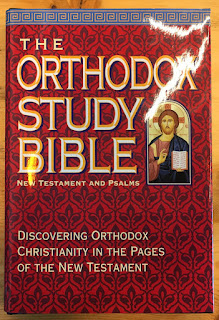Monday, November 19, 2018
The Orthodox Study Bible: Unwise arguments
The Orthodox Study Bible, New Testament and Psalms, (1993) Saint Athanasius Orthodox Academy,Thomas Nelson Publishers, Nashville, Tennessee.
Purchased from my employer, the Canadian Bible Society @ Cafe Logos, Vancouver. This text review continues...
As example, some key New Testament verses to consider while engaged in a discussion that could become a heated argument.
New American Standard Bible (My preferred version)
2 Timothy 2:23-26
New American Standard Bible (NASB)
23 But refuse foolish and ignorant speculations, knowing that they produce [a]quarrels. 24 The Lord’s bond-servant must not be quarrelsome, but be kind to all, able to teach, patient when wronged, 25 with gentleness correcting those who are in opposition, if perhaps God may grant them repentance leading to the knowledge of the truth, 26 and they may come to their senses and escape from the snare of the devil, having been held captive [b]by him to do his will.
Footnotes:
2 Timothy 2:23 Lit fightings
2 Timothy 2:26 Or by him, to do His will
Titus 3:9-11 New American Standard Bible (NASB)
9 But avoid foolish controversies and genealogies and strife and disputes about the Law, for they are unprofitable and worthless. 10 Reject a factious man after a first and second warning, 11 knowing that such a man is perverted and is sinning, being self-condemned.
From the Orthodox Study Bible: New King James Version (NKJV)
Interesting with notes...
From 2 Timothy
2: 20-23 that 'Heresy corrupts: bad theology leads to bad behaviour' (498).
2: 24-26 that 'Good theology helps us along the bath to good behaviour'. (498). The text further opines that good theology instills in followers 'reasonable patience and gentleness toward all people.' (298). This approach should even be given to false teachers, although they should be understood as such. (298). The text calls them enemies that should be avoided, and in the New Testament, we are of course in the Christian Church to love our enemies (Matthew 5, Luke 6).
From Titus 3
The Orthodox text describes the divisive person as one who 'picks' or 'chooses from' the whole truth. (506). Incomplete or erroneous beliefs are defended which lead to immorality, states the text. (506).
This concept of being selective with truth fascinates me because often arguments are based on selective premises and conclusions, lacking objectivity to certain extents. If greater objectivity in premises and conclusion was embraced, less arguments would occur.
Subscribe to:
Comments (Atom)

